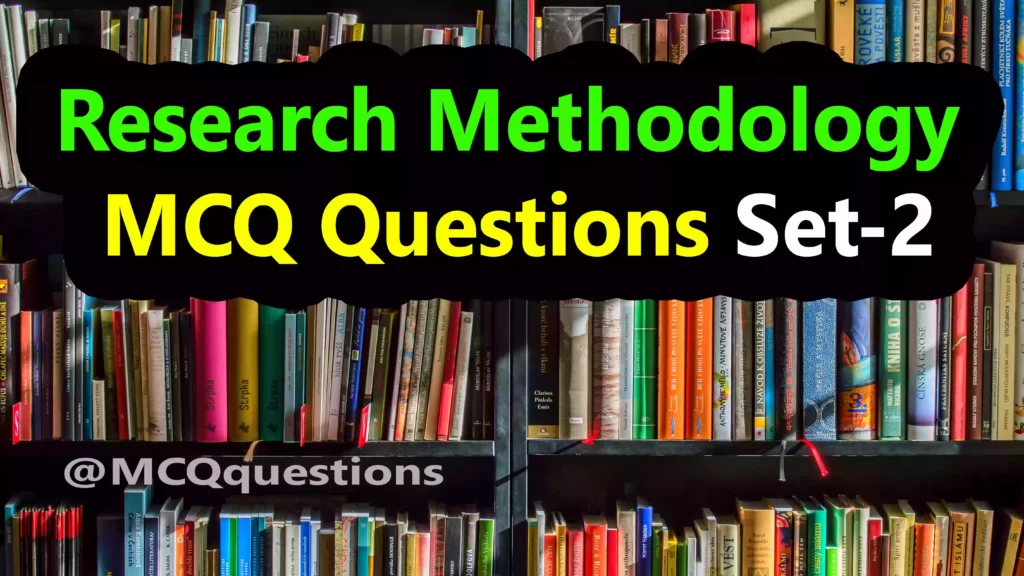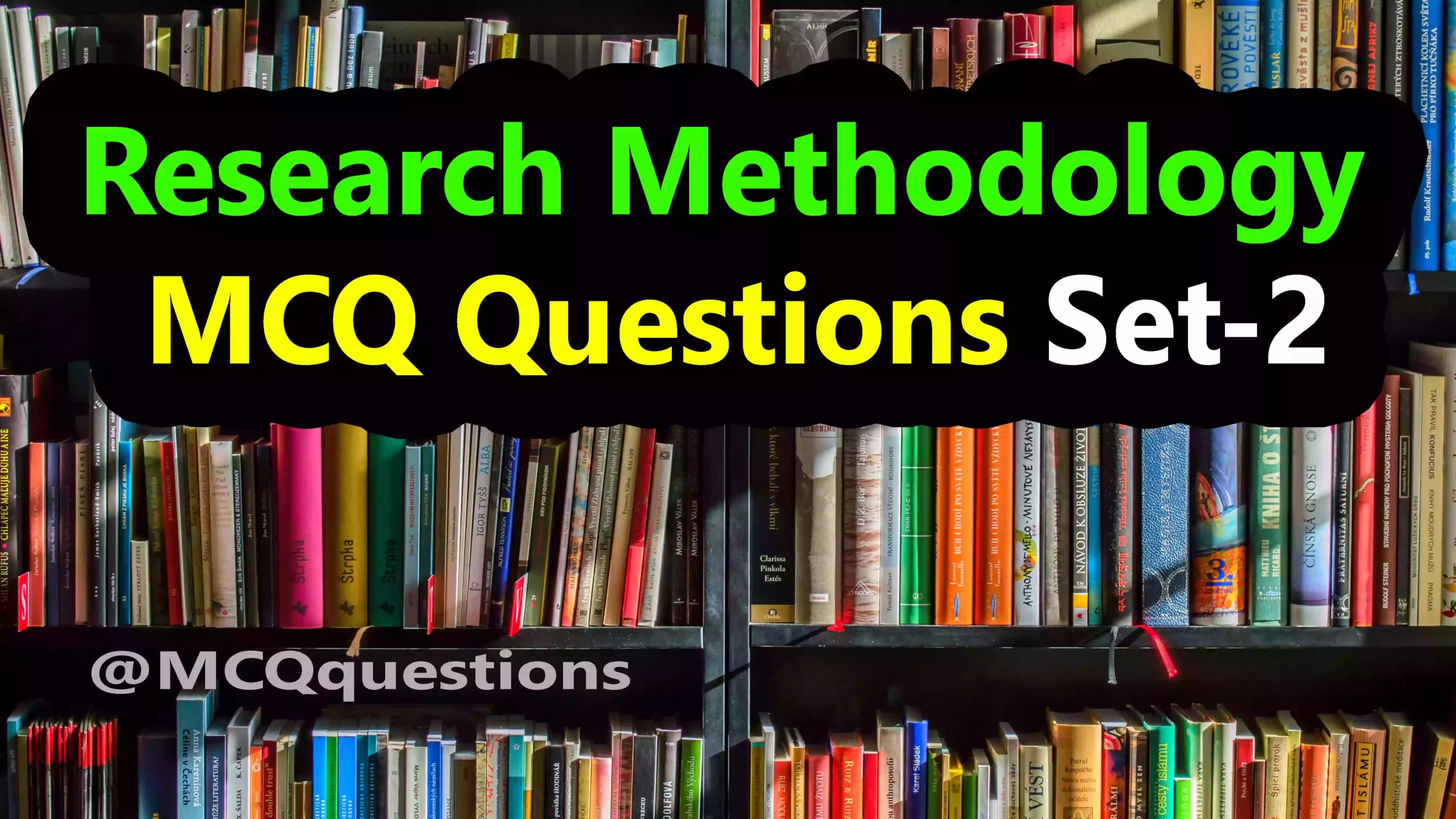Research Methodology MCQ

Research Methodology MCQ
Also you can read
1. Which is not the characteristic of research
(A) Basic Research
(B) Holistic Perspective
(C) Context Sensitivity
Answer (D) Ex-Post Facto Research
2. The different between the Ex-Post Facto Research and Experiments research is
(A) Expose
(B) Control
(C) Search
(D) None of the above
Answer (B) Control
3. Ex-Post Facto Research could be
(A) Large
(B) Small
(C) Both
(D) None of the above
Answer (C) Both
4. Part of social research is
(A) Laboratory experiment
(B) Field Experiment
(C) Survey research
(D) All of the above
Answer (D) All of the above
5. Kotz has been divided field studies into
(A) Exploratory
(B) Hypothesis testing
(C) Both of the above
(D) None of the above
Answer (C) Both of the above
6. Which of the following is a step of research design?
(A) Defining the problem and formulating a hypothesis
(B) Collecting data
(C) Drawing inferences from the data
(D) All of the above
Answer (D) All of the above
7. Which of the following is the chief characteristic of sampling methods?
(A) Economy
(B) Reliability
(C) Feasibility
(D) All of the above
Answer (D) All of the above
8. Scientific methods are used in
(A) only research projects in pure sciences
(B) social science researches
(C) Both ‘A’ and ‘B’
(D) Neither ‘A’ nor ‘B’
Answer (C) Both 'A' and 'B'
9. Which of the following is a type of hypothesis?
(A) Interrogative hypothesis
(B) Declarative hypothesis
(C) Directional hypothesis
(D) All of the above
Answer (D) All of the above
10. Which of the following is a non-probability sampling method?
(A) Simple random sampling
(B) Systematic sampling
(C) Cluster sampling
(D) Quota sampling
Answer (D) Quota sampling
11. In which of the following cases, the formation of hypothesis may not be necessary?
(A) Investigative historical studies
(B) Experimental studies
(C) Normative studies
(D) Survey studies
Answer (C) Normative studies
12. A researcher divides the whole population in different parts and then fixes the no. of units from each of the parts that are to be included in the sample. The method of sampling used by him is
(A) Stratified random sampling
(B) Cluster sampling
(C) Quota sampling
(D) All of the above
Answer (C) Quota sampling
13. For the population with finite size which of the following sampling method is generally preferred?
(A) Cluster sampling
(B) Area sampling
(C) Preposive sampling
(D) Systematic sampling
Answer (D) Systematic sampling
14. A research is based on
(A) Ideas of the scientists
(B) Experiments
(C) Scientific method
(D) Some general principles
Answer (C) Scientific method
15. The scientific study of the historical back ground of the events to determine its bearing on the present conditions is called
(A) Philosophical research
(B) Action research
(C) Experimental research
(D) Historical research
Answer (D) Historical research
16. Research and Development (R&D) has now become the index of development of country because
(A) R&D reflect the true economic and social conditions prevailing in a country
(B) R&D targets the human development
(C) R&D can improve the standard of living of the people in a country
(D) All of the above
Answer (D) All of the above
17. The word ‘unscientific means
(A) Prejudices and biases
(B) Useless arguments
(C) Not being in harmony
(D) All of the above
Answer (D) All of the above
18. Who put forward the statement, “Research is an honest effort carried out through insight”?
(A) Watson
(B) Binet
(C) Best
(D) Cook
Answer (A) Watson
19. The Data of research is, generally
(A) Qualitative only
(B) Quantitative only
(C) Both ‘A’ and ‘B’
(D) Neither ‘A’ nor ‘B’
Answer (C) Both 'A' and 'B'
20. Which of the following is a paramount requirement of a Researcher?
(A) Scientific thinking
(B) Scientific feeling
(C) Scientific behaviour
(D) Scientific attitude
Answer (D) Scientific attitude
21. A research aims at
(A) Verifying the existing knowledge
(B) Acquiring new knowledge
(C) Filling the missing links in the existing Knowledge
(D) All of the above
Answer (D) All of the above
22. Longitudinal approach of Research deals with
(A) Short-term researches
(B) Long-term researches
(C) Horizontal researches
(D) None of the above
Answer (B) Long-term researches
23. Action research means
(A) A longitudinal research
(B) An applied research
(C) Research which are initiated to solve the immediate problems
(D) All of the above
Answer (C) Research which are initiated to solve the immediate problems
24. Why Yamuna Action Plan’, is an Action Research Plan?
(A) It has a definite goals and objectives
(B) It is to be finished in a pre-determined schedule
(C) It has a definite socio-economic objective
(D) All of the above
Answer (D) All of the above
25. Which of the following Researches emphasise primarily the factual aims?
(A) Philosophical researches
(B) Historical researches
(C) Theoretical researches
(D) Behavioral researches
Answer (B) Historical researches
